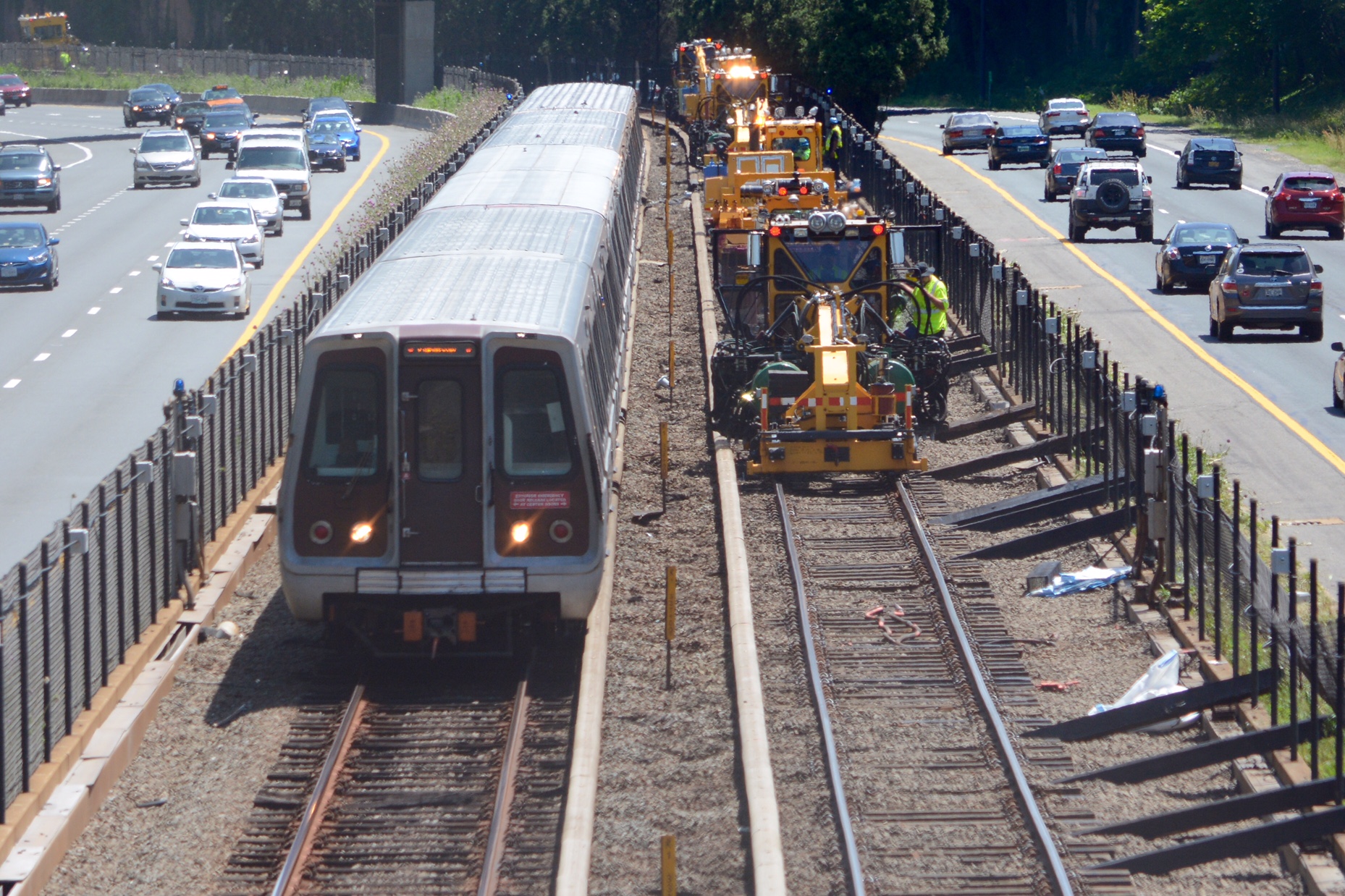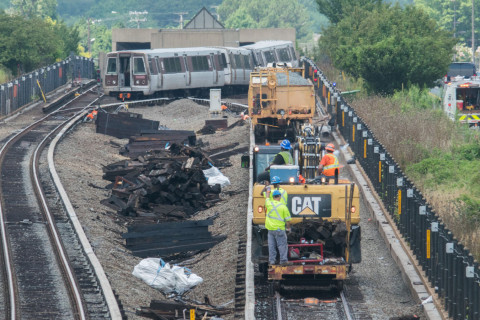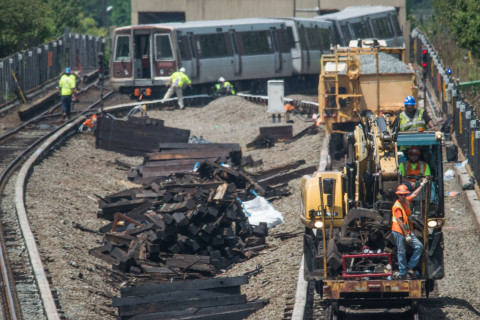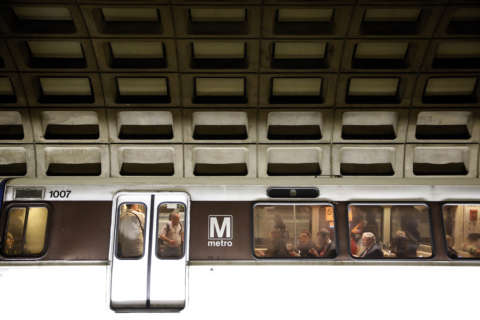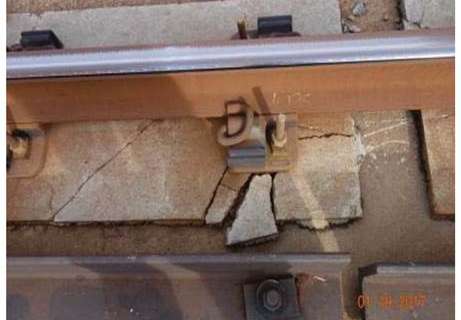WASHINGTON — Five members of Metro’s track inspection department who were fired over what the agency called falsified inspection reports that were exposed after a derailment last summer call Metro’s conclusions “completely fraudulent” in a new lawsuit.
The lawsuit, filed in federal court in the District last week, outlines new details of the claims from track workers that at least some of the problems on the tracks were properly reported to Metro but that maintenance work was never scheduled to address the issues.
Nearly half of Metro’s track inspection department was disciplined in some way over what Metro said were falsified reports. At least 16 front-line workers and five supervisors were fired.
The lawsuit is separate from the five workers’ direct challenges to their firings.
All of the workers fired in connection with track inspection reports that were copied month after month are now officially challenging their discipline through grievances that could eventually be decided by arbitration panels, Amalgamated Transit Union Local 689 Communications Coordinator David Stephen told WTOP.
That includes the five who filed the lawsuit.
Cases that go to arbitration can take a year or longer to resolve.
The details
After the July 29 derailment of a train near East Falls Church on tracks that slipped too far apart on crumbling crossties, Metro launched a complete review of track inspection procedures.
Among other things, the review found many inspection reports were copied precisely from one month to the next, including at the location of the derailment.
“The fact that the track measurements on the documents remained unchanged does not indicate the report is falsified, but rather that the track has not shifted and there are no glaring issues with the track measurements,” the suit claims.
It would be highly unusual for the distance between the tracks or the precise number of defective crossties to remain precisely the same down to the 1/16 of an inch month after month, year after year, safety experts have said.
A track inspection supervisor who worked on the Orange Line until the start of 2016 when he was transferred to the Red Line argues in the suit that he should not be held responsible for issues tied to the East Falls Church derailment since he had not been responsible for supervising the inspectors there for months.
Christopher Bell of Temple Hills and the four other plaintiffs said in the lawsuit they never falsified any documents.
Bell was interviewed by a maintenance supervisor and Metro Transit Police in the days following the July derailment. On Aug. 15, he met with General Manager Paul Wiedefeld, the lawsuit said.
He was fired 11 days later.
“Bell was not given a hearing, or any opportunity to dispute the charges against him and present evidence to be considered in his defense, before his termination,” the lawsuit said.
The other plaintiffs allege the same issue.
Track inspection supervisors such as Jason Brown of Fort Washington argue in the lawsuit that they could not have falsified records because they only signed off on the switch inspections done by the inspectors they supervised and did not do the inspections themselves.
Brown was among a much larger group of inspectors and lower-level supervisors fired in December and January after Metro completed a review of questionable track inspection reports across the entire system.
In addition to challenging whether Metro could have expected him to compare reports to previous months to find potential red flags, Brown charges in the suit that Metro took his statements from interviews out of context in his termination letter.
Maintenance workers for the high-level supervisors who plan track work bear more responsibility for the summer’s derailment than the inspection department, the suit claims, since inspectors did report issues of some kind in a number of areas that were not addressed.
The lawsuit seeks unspecified damages and a promise to change policies in the future to avoid what the fired workers claim is racial discrimination.
The workers, who like the majority of the inspection department’s front line workers are black, claim that the agency disciplines them “as scapegoats for issues that resulted from the willful neglect of senior WMATA officials.”
The numbers the lawsuit cites do not clearly show any disproportionate impact of firings on black track workers and inspectors.
Metro did not comment on pending litigation.
Track walker Brandon Spencer of Lanham was fired on Jan. 4, 2017, and track inspector Lamar Morgan of Clinton was fired on Jan. 9, 2017.
Morgan indicated he was fired due to what Metro found to be faulty switch inspections on the Red Line at Fort Totten that were copied precisely from one inspection form to the next.
The lawsuit argues, though, that Morgan had complained for more than a year that the switch there needed to be repaired and nothing was done.
Another Metro worker, Leon Myers of Upper Marlboro, got his termination letter in the mail because he had gone to the emergency room to deal with back pain.
He claims that letter had “numerous errors” and “falsely accused” him of allowing track walkers he had supervised to submit reports that were simply copied from one month to the next.
Myers had been promoted from the track inspection department to become a maintenance manager in the structures department, and had interviewed for another promotion just weeks before he was fired in December 2016.
He left the inspection department in March 2015, so the lawsuit said there is no way he could have properly signed an inspection document in May 2015 that was cited as a reason to fire him.
In other cases, workers have testified that they sometimes used pre-signed forms for certain inspections.
The fired workers also list nine other people in the lawsuit who may have only gotten a warning rather than getting fired over the falsified reports, despite having similar responsibilities.
Other track safety issues
Separately, Bell said he refused to discipline a track inspector in late 2015 for putting speed restrictions in place for safety, despite direction to do so from his superiors.
In that case, the suit said track inspector Trap Thomas had properly reported the issue weeks earlier.
The complaint does suggest it is possible a follow up report may not have been entered completely since the initial report was already in the system.
Thomas said in January as he challenged his own firing over what Metro called falsified inspection reports that he was regularly pressured to keep trains moving, and could be disciplined for slowing trains down when safety issues cropped up.
In another instance, Bell said work that might have been completed in the middle of the day, before rush hour, instead lead to additional delays one day in the fall of 2015 because a supervisor directed him not to call in Metro’s Emergency Response Team to make a repair.
Instead, as ordered by a supervisor, Bell said he attempted to fix it himself without the proper tools or training, only for the response team to still be needed later anyway.

